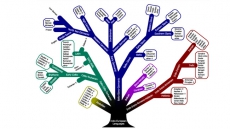Ladies please take note! If your hubby does not feel like going to parties or social gatherings with you, do not fret especially if he is in his late 30s.
Researchers including an Indian-origin researcher have revealed that the social circle of men reduces after they get married while women become more socially active from late 30s onwards.
"Young men are more connected than young women and the patterns of connection change for both men and women as they grow older," said Kunal Bhattacharya from Aalto University in Finland.
The findings indicate that after age 25, the social circle of men starts shrinking until it stabilises again in the late 40s.
After 60s, the decay begins again and old men appear to be rather socially isolated.
To reach this conclusion, the team analysed unnamed call records, gender and age information of three million mobile phone users from an European country to understand the communication patterns of individuals.

The results indicate that at age 25, both men and women are able to invest time in maintaining large social circles.
"The number of connections reaches maximum at age 25 for both genders. While men maintain a lot of casual relationships and women seem to be more focused on their romantic partner," Bhattacharya added in the paper published in the journal Royal Society Open Science.
From late 30s onwards, women become more connected than men. This is when people get married, settle down and participate in parenthood.
"The communication patterns of women would suggest their pivotal roles as parents and grandparents," Bhattacharya noted.
From late 40s till mid-60s, the number of contacts becomes rather stable. This is the period when individuals divide time between varied family relations, such as children, parents, in-laws of children and friends.
"The patterns in communication reflect the social goals of individuals. There is a clear difference in which men and women maintain their relationships," the authors suggested.





